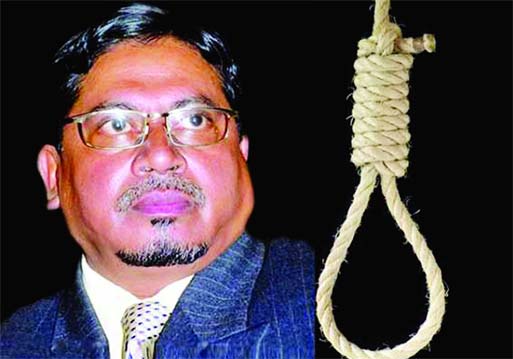
CM Kajawl :Jamaat-e-Islami leader and former Al Badr commander Muhammad Kamaruzzaman was executed at Dhaka Central Jail on Saturday for committing crimes against humanity during the Liberation War of Bangladesh in 1971. Kamaruzzaman, who preferred gallows to seeking mercy, was hanged to death at 10:30pm. Deputy Commissioner of Dhaka Tofazzal Hossain Mia, Civil Surgeon Abdul Maleque Mridha, Director (Intelligence) at RAB Headquarters Lt Col Mohammad Abul Kalam Azad, Inspector General (Prison) Brig Gen Syed Iftekhar Uddin, DIG (Prison) Golam Haider and Additional IGP (Prison) Col Md Fazlul Kabir, Senior Superintendent of Dhaka Central Jail Forman Ali were present during the execution. Later, the body of Kamaruzzaman was sent to Sherpur for burial at the premises of Mudipara orphanage, some four kilometers from the district headquarters. Kamaruzzaman, the Assistant Secretary General of Jamaat-e-Islami, was the second man, who was executed after being convicted by the International Crimes Tribunal (ICT) after his party colleague Abdul Quader Mollah. Before the execution, Kamaruizzaman took his bath and offered Namaj. He also offered ‘towba’ (the last mercy prayer to Allah) and underwent medical tests before being moved to scaffold. Earlier, the Appellate Division of the Supreme Court (SC) rejected his review petition on his death penalty on April 6, leaving Kamaruzzaman with no other option but to move a mercy petition for presidential clemency. However, despite taking nearly two days time, Kamaruzzaman finally decided not to seek presidential mercy. The jail authorities asked him several times on Friday whether he would seek mercy to the president, but he replied in the negative, the State Minister for Home Asaduzzaman Khan Kamal said. Kamaruzzaman’s son Hasan Iqbal said after meeting his father on Saturday that his father was reluctant to move a mercy petition to the President, saying that “who is the President to give him mercy”. “He (Kamaruzzaman) believes in Allah. If he needs to seek mercy, he will pray to Allah, not to the President,” he said after meeting Kamaruzzaman in the prison at around 5:20pm. The jail authority called Kamaruzzaman’s family at around 2:00pm to meet the convict in the prison and they reached the Dhaka Central Jail at 4:20pm, Iqbal said. In total, 21 family members including the wife and children of Kamaruzzaman entered the prison to meet him for the last time. Kamaruzzaman was not seen worried and after the meeting he saw off his family members in a smiling face, Iqbal said. Earlier, the Home Ministry sent the executive order for execution of Kamaruzzaman to the jail shortly after midday. The jail authority read out the order to him at around 3:00pm. Kamaruzzaman was finally executed as the allegation of Shohaghpur mass killing was proved beyond any reasonable doubt. With the instruction of Kamaruzzaman, the members of Al Badr and Razakar in association with Pakistani occupation army committed mass killing in Sohaghpur village of Nalitabari upazila in Sherpur on July 25, 1971. They killed 144 unarmed civilians including a number of women, who were also raped by the anti-liberation elements.Kamaruzzaman was sentenced to death unanimously by the International Crimes Tribunal (ICT) on two charges out of seven allegations of crimes against humanity on May 9, 2013. The two charges were Shohaghpur killing and the murder of Golam Mostofa Talukder.The 63-year-old Jamaat leader then filed appeal with the Supreme Court against the tribunal’s judgment on June 6 in the same year. The four-member bench of the Appellate Division of the Supreme Court also upheld his death penalty for Shohaghpur killing by a 3-1 majority decision. Chief Justice Surendra Kumar Sinha, Justice Hasan Foez Siddique and Justice AHM Shamsuddin Choudhury sustained the death penalty, while Justice Md Abdul Wahhab Miah commuted the punishment to life imprisonment. The death sentence for the murder of Golam Mostofa was unanimously commuted to life imprisonment. The Appellate Division passed its judgment on November 3 last year, but released the full text of the verdict on February 18. The Tribunal issued the death warrant the following day. The convict then moved forward a review petition with the Supreme Court, seeking a reconsideration of the verdict on March 5. Abdul Quader Mollah, also the Assistant Secretary General of Jamaat-e-Islami, was hanged to death for his involvement in 1971 felonies on December 12, 2013.Kamaruzzaman, the son of late Insan Ali Sarker, was born in Sherpur district on July 4 1952. He started student politics as a supporter of Islami Chatra Sangha (ICS), the student wing of Jamaat-e-Islami before the independence of Bangladesh, in 1967 when he was a student of class X at Sherpur GKM Institution.He was the secretary of a hall unit of ICS at Jamalpur Ashek Mahmud Degree College when he was a degree student. He held the post of office secretary of East Pakistan ICS. He played a key role to form Al Badr at greater Mymensingh area as an ICT leader during the Liberation War.Under the leadership of Kamaruzzaman, all the students belonging to ICS of greater Mymensingh area were absorbed to Al Badr. Prosecution submitted formal charge against Kamaruzzaman to the ICT-1 on January 15, 2012, implicating him in nine allegations. The tribunal took the charges into cognizance on January 31 in the same year. But the case of Kamaruzzaman was transferred to the ICT-2 on April 16, 2012. The tribunal framed seven charges against Kamaruzzaman on June 4, 2012 for his involvement in different 1971 atrocities including murder, torture, rape, arson, confinement and deportation during the Liberation War. A total of 18 prosecution witnesses including investigation officer Abdur Razzaq Khan gave their depositions against Kamaruzzaman, while five defence witnesses testified for the Jamaat leader. The proceedings of the trial ended on April 16, 2013Kamaruzzaman was arrested in a case of mass killing on July 13, 2010. He was shown arrest by the ICT on the allegations of crimes against humanity on August 2 in the same year.

